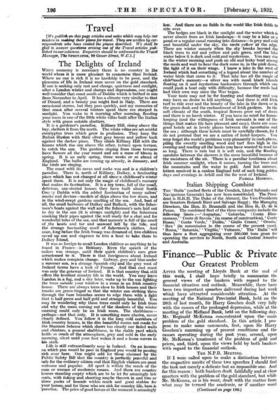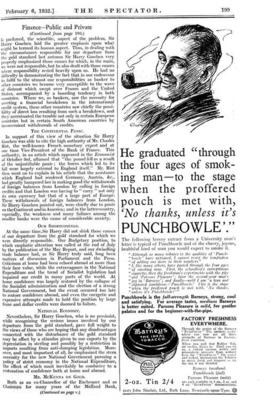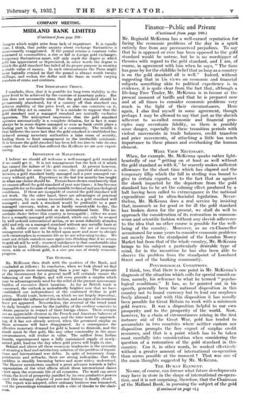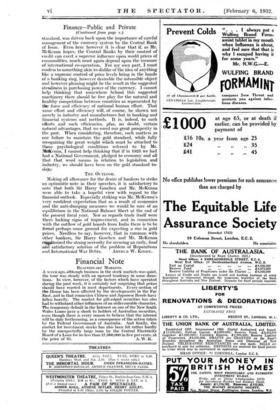Finance—Public & Private
Our Greatest Problem
AFTER the meeting of Lloyds Bank at- the end of this week, I shall hope briefly to summarize the general views of the bankers with regard to the fmancial situation and outlook. Meanwhile, there have been two important speeehes delivered during last week which haste attracted considerable attention. At the meeting of the National Provincial Rank, held on the 28th of last month, Sir Harry Gosehen dealt very fully with the causes of the prolonged depression, while at the meeting of the Midland Bank, held on the following day, Mr. -Reginald -McKenna concentrated -upon the- main problem of .the . gold standard.. In this article. I pro- pose to make some comments, first, upon Sir Harry Goschen's summing lip of present conditions and the causes operating during the past year, second, upon Mr. McKenna's treatment of the problem of gold and prices, and, third, upon the views held by both bankers with regard to the financial outlook.
Tan N.P.B. MEETING. If-i were called upon to make a distinction between the respective merits of these two speeches I should find the task not merely a delicate but an impossible one. And for this 'reason : both hankers dealt faithfully and at close quarters with the problem of the gold.standard, but while Mr.. McKenna, as is his wont, dealt with the matter from what may be termed the academic, or if another word (Continued on page 199.)
Finance—Public and Private
(Continued from page 190.) is preferred, the scientific, aspect of the problem, Sir Harry Goschen laid the greater emphasis upon what might be termed its human aspect. Thus, in dealing with the circumstances responsible fOr -our departure from the gold standard last autumn Sir Harry Gosehen very properly emphasized those causes for which, in the main, we were not responsible, but he also dealtwith those causes where responsibility rested heavily upon us. He had no difficulty m demonstrating the fact that in our endeavour to fulfil to the utmost Our responsibilities as banker to other countries we became very susceptible to the wave of distrust which swept over France and the United States,. accompanied by a hoarding tendency in both countries. Where we, as bankers, saw the necessity, for averting a financial breakdown in the international credit system, these other countries saw chiefly the possi- bility of direct loss resulting from such a breakdown, and they accentuated the trouble not only in certain European countries but in certain South American countries by inconvenient withdrawals of credits.
THE CONTINENTAL PANIC.
In support of this view of the situation Sir Harry Goschen-was able to cite the high authority of Mr. Charles Rist, the well-known French monetary expert and at one time Vice-President of the Bank of France. This authority, in an article which appeared in the Economist of October 3rd, affirmed that "the pound fell SS a result of the unjustifiable panic ; the forces which led to its fall were largely external to England itself." Mr. Rist then went on to explain in his article that the assistance which England had rendered Germany, Austria, &c., had greatly hampered her in making good the withdrawals of foreign balances from London by calling in foreign credits and that London was having to" carry" not only its own currency but that of a large part of Europe. These withdrawals, of foreign balances from London; Sir Harry Goschen pointed out, were chiefly due to panic on the Continent and in America; and in the latter country, especially, the, Weakness and many failures 'among the snuffler banks -were the cause of considerable anxiety..
OUR SHORTCOMINGS.
At the same time, Sir Harry did not shirk those causes of our departure from the gold standard for which we were directly responsible. Our Budgetary position, to which emphatic attention was called at the end of July by the publication of the May Report, and our dwindling trade balance had, as Sir Harry truly said, long been matters of discussion in Parliament and the Press. Criticisms at home had been echoed abroad at more than their face value, while the extravagance in the National Expenditure and the trend of Socialist legislation had impaired our credit in Many parts of the world. At home confidence was largely restored by the collapse of the Socialist administration and the election of a strong National Government, but the event occurred too late to restore confidenCe abroad, and even the energetic and expensive attempts' made to hold the position by large franc and dollar credits were doomed to failure.
NATIONAL ECONOMY.
Nevertheless, Sir Harry Goschcn, who is no pessimist, while recognizing the serious issues involved by our departure from the gold standard, gave full weight to the views of those who are hoping that any disadvantages connected with the disturbance of the gold standard may be offset by a stimulus given to our exports by the depreciation in sterling and possibly by a restriction in imports resulting from anti-dumping legislation. More- over, and most important of all, he emphasized the stern necessity for the new National Government pursuing a policy of strict economy in the National Expenditure, the effect of which must inevitably be conducive to a restoration of confidence both at home and abroad.
Ma. MeICENNA ON GOLD.
Both as an ex-Chancellor of the Exchequer and as Chair/n:0i for many years of the -Midland Bank,
(Continued on page v.)
Finance—Ptblic and Private (Continued from page 199.)
Mr. Reginald McKenna has a well-earned reputation for facing the economic problems of the day in a spirit entirely free from any preconceived prejudices. To say that he is opposed or ever has been opposed to the gold standard would be untrue, but he is no worshipper of theories with regard to the gold standard, and I am, of course, in agreement with him when he says, "The time has gone by for the childlike belief that as long as a country is on the gold standard all is well." Indeed, without suggesting that in his views on economic and financial subjects something akin to political expediency is in evidence, it is quite clear from the fact that, although a life-long Free Trader, Mr. McKenna is in favour at the present moment of tariffs and that he is prepared now and at all times to consider economic problems very much in the light of their circumstances. Here again, I also find myself in some agreement, though perhaps I may be allowed to say that just as the slavish adherent to so-called economic and financial prin- ciples may overstrain fidelity, so there is possibly some danger, especially in these transition periods with violent movements in trade balances, credit transfers and price movements, of attaching a little too much importance to these phases and overlooking the human element.
WIDE VIEW NECESSARY.
When, for example, Mr. McKenna speaks rather light- heartedly of our getting on at least as well without the gold standard as with it," he scarcely makes sufficient allowance for the short time which has elapsed and the temporary fillip which the fall in sterling was bound to give to certain exports, or to the fact that as against the shock imparted by the departure from the gold standard has to be set the calming effect produced by a halt having been called to extravagance in the national expenditure and to ultra-Socialist legislation. Never- theless, Mr. McKenna does a real service by insisting that, inasmuch as for good or for ill the gold standard has broken down for the present, we shall do well to approach the consideration of its restoration in common- sense and scientific fashion without any slavish adherence to the idea that no other course is possible for the well- being of the country. Moreover, as an ex-Chancellor accustomed for some years to consider economic problems not merely, from the standpoint of the London Money Market but from that of the whole country, Mr. McKenna brings to his subject a particularly desirable type of mind, for in the meantime lie has also been able to observe the problem front the standpoint of Lombard Street and of the banking community.
PSYCHOLOGICAL CONDITIONS.
I think, too, that there is one point in Mr. MeKenna's diagnosis of the situation which calls for special considera- tion, namely, his reference to what he termed "psycho- logical conditions." It has, as he pointed out in his speech, generally been the national disposition in this country not to hoard currency but to lend our surpluses freely abroad ; and with this disposition it has usually been possible for Great Britain to work with a minimum gold reserve. It was a disposition helpful to our own prosperity and to the prosperity of the world. Now, however, by a chain of circumstances arising in the first instance out of the Great War, gold has tended to accumulate in two countries where neither custom nor disposition prompts the free export of surplus credit resources, and that is a point which has to be taken most carefully into consideration when considering the question of a restoration of the gold standard in this country. Can it, in other words, be worked effectively without a greater amount of international co-operation than seems possible at the moment ? That was one of the main thoughts suggested by Mr. McKenna.
THE HUMAN ELEMENT.
No one, of course, can foresee what future developments may have in store in the shape of international co-opera- tion, and it is not surprising, therefore, that the Chairman of the Midland Bank, in pursuing the subject of the gold (Continued on page vi.) Finance—Public and Private (Continued from page v.) standard, was driven back upon the importance of careful management of the currency system by the Central Bank of Issue. Even here however it is clear that if, as Mr. McKenna hopes, the Central Banks by their control of credit can exert a supreme influence upon world prices of commodities, much must again depend upon the measure of international co-operation. For my own part, I must confess to something akin to dislike of the idea of anything like a supreme control of price levels being in the bands of a banking ring, however desirable the ostensible object and however pleasing might be the result in the suggested steadiness in purchasing power of the currency. I cannot help thinking that somewhere behind this suggested machinery there should be free play for the natural and healthy competition between countries as represented by the force and efficiency of national human effort. That same effort and efficiency will, of course, be shown not merely in industry and manufactures but in banking and financial systems and methods. It is, indeed, to such ciforts and such efficiencies, phis, no doubt, certain natural advantages, that we owed our great prosperity in the past. When considering, therefore, such matters as our failure to maintain the gold standard, while fully recognizing the great weight which must be attached to those psychological conditions referred to by Mr. ThsliIenna, I cannot help thinking that if in 1925 we had had a National Government, pledged to economy and all that that word means in relation to legislation and industry, we should have been on the gold standard to- dayrr
THE OUTLOOK.
Making all allowance for the desire of bankers to strike an optimistic note in their speeches, it is satisfactory to note that both Sir Harry Gosehen and Mr. McKenna were able to take a hopeful view with regard to the financial outlook. Especially striking was Mr. McKenna's very confident expectation that as a result of economies and the anti-dumping measures we would be sure of an equilibrium in the National Balance Sheet at the end of the present fiscal year. Nor as regards trade itself were there lacking signs of improvement, and in connexion with the outflow of gold hoards from India there is to be fotmd perhaps some ground for expecting a rise in gold prices. Needless to say, however, that in common with other bankers, Sir Harry Gosehen and Mr. McKenna c*Itasized the strong necessity for securing an early, final 'arid satisfactory solution of the problem of Reparations
and3nternational War Debts. ARTHUR W. KIDDY.











































 Previous page
Previous page